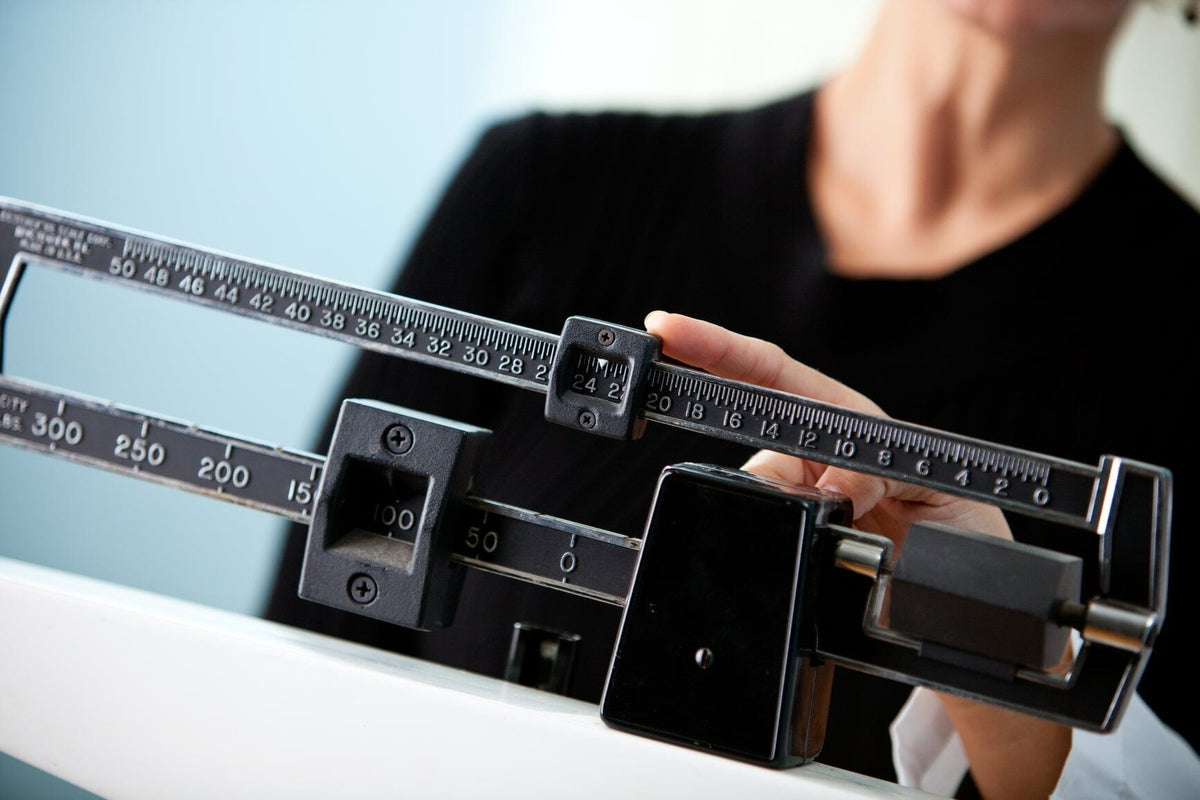Many people associate weight gain with menopause, and for good reason — changes in weight and body composition are a common side effect of the hormonal evolution that occurs during the menopausal transition.
But these changes in weight don’t always mean gain — they can also include weight loss. You may be wondering, why am I losing weight in menopause? Understanding the factors that can contribute to losing weight in menopause may help ease concerns around the ways your body is changing, or might change in the future, as you embark on your menopausal journey.
How Common is Weight Loss During Menopause?
While losing weight during menopause isn’t commonly spoken about, it’s not something that affects many women. “Weight loss experienced during menopause is not very common,” explains Shannon Brasil, a board-certified nurse practitioner who specializes in menopause care. “More often, a redistribution of weight to the midsection of the body is noted, which makes women feel like they may have actually gained weight.”1
How do Hormones Impact Weight During Menopause?
The hormone fluctuations that start during perimenopause and continue through menopause don’t directly influence hunger, but they may have secondary effects on the dietary habits of menopausal women.
“The loss of estrogens and progesterone during menopause is not directly linked to the appetite center in the hypothalamus,” Brasil says. “However, the loss of these hormones can often cause women to not sleep well, feel fatigued and even irritable, which can indirectly lead to feelings of hunger.”2
Reasons for Unexplained Weight Loss in Menopause
While they often indirectly increase appetite, hormone changes can also affect the body in ways that may make a woman want to eat less during menopause. These may include:
Digestive Issues
Science suggests a link between hormone fluctuations and gastrointestinal (GI) problems, with many women experiencing bloating and abdominal pain during menopause.3 These symptoms could potentially cause women to eat less, or differently, which in turn, can contribute to weight loss.
Mood Changes
“Physical and mental changes that occur during this transitional period of life can lead to depression, which can decrease appetite and contribute to weight loss,” Brasil says.4 Anxiety during menopause can also lead to weight loss; people may lose up to 15% of their body weight due to an anxiety and the chronic stress associated with it.5
Loss of Muscle Mass
Decreased levels of estrogen during menopause can affect muscle size and function, leading to a loss of muscle mass.6Althought the loss of muscle mass can lead to a lower metabolic rate, when you lose muscle, you may also lose weight, overall7, as muscle tends to be denser than fat.
Mouth and Taste Changes
Mucus membranes in the mouth have sex hormone receptors. Because of these receptors, changing hormone levels during menopause can contribute to the onset of unique sensations including mouth burning, numbness and tingling.8
Estrogen receptors in the mouth may also affect a woman’s sense of taste during menopause.9 Decreased appetite may occur as a result of these new mouth sensations and changes in taste.
When to See a Healthcare Provider
Losing weight fast in menopause could be cause for concern. Anytime you experience sudden weight loss, you should talk to your healthcare provider. Nurse Brasil cautions that significant weight loss during and after menopause should be thoroughly evaluated, since it could be happening because of other undiagnosed disorders.
“Any unintentional weight loss greater than 10% of a woman’s body weight should be evaluated by a healthcare provider, as well as any weight loss accompanied by unusual symptoms,” Brasil says.
Menopause and Weight Loss
Once you and your healthcare provider have ruled out any underlying health problems, you can work together to create a nutrition plan that will help you maintain a healthy weight through menopause and beyond.
Resources
- https://www.menopause.org/for-women/sexual-health-menopause-online/changes-at-midlife/changes-in-weight-and-fat-distribution
- https://www.ncbi.nlm.nih.gov/pmc/articles/PMC6947726/
- https://www.ncbi.nlm.nih.gov/pmc/articles/PMC3322543/
- https://www.hopkinsmedicine.org/health/wellness-and-prevention/can-menopause-cause-depression
- https://www.anxietycentre.com/anxiety-disorders/symptoms/weight-loss/
- https://www.menopause.org.au/hp/studies-published/new-potential-mechanism-underlying-loss-of-muscle-mass-during-menopause
- https://www.healthline.com/health/unexplained-weight-loss
- https://www.medicalnewstoday.com/articles/323424#home-remedies
- https://www.ncbi.nlm.nih.gov/pmc/articles/PMC4195183/









Comments
Post commentHi , yes I have lost 2 stone , and muscle. Night and day sweats headaches restless nights and no mo Jo .
I going through menopause I was 180 now I’m 172 no libido muscle mass is gone appetite isn’t the same before this I do have hot flashes at night.Im 57 feel like 87 some days also had all teeth removed last year I don’t know if the weight loss from menopause and starting to get constipation now
Hi ladies, I am also experienced a lot of weight loss as well. I am 46 years old 4"11 I used to weigh 105 pounds i am currently at 90 pounds. I have experienced mood swings, very emotional, hard time sleeping. Night sweats, also gut issues. I went from lose stool to hard stool. A lot of bloating, very gassy as well. I am so exhausted all the time. I have anxiety like no other. I feel so alone in all this perimenopause thing. I always hear women gaining weight and I am losing so much fat and a lot of muscle. I try to eat but my appetite is slim. I notice right before my period about a week before I am so hungry and I will eat with no problem, until my period starts ,I go back to no appetite.
Hello all. I’m still Perimenopause. This month I realized I have lost weight too and my clothes are loose. Any ladies got good advice of gaining weight? I look quite skinny at the top, arms and on my hips, but my belly and thighs are big. I eat about the same, must be the Menopause messing our hormones. Wish I was the old self!
Im 58,hot flashes are back, but I’ve lost 16 pounds in 4 months 1 was 122 size 6, now 106 size 1, I haven’t been a size 1 since Jr. High! I don’t like this.